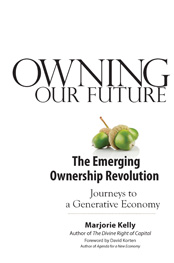Looking around at the wreckage left in the wake of the world economy’s latest crisis, veteran business journalist Marjorie Kelly noticed that some institutions were left relatively unscathed. What did they have in common? The key, Kelly realized, is seemingly obscure: ownership. Prominent among the survivors were organizations that combined the flexibility of traditional private ownership with a focus on the common good.
As long as businesses are set up to focus exclusively on maximizing quarterly returns for a limited group of individuals, the economy will be plagued by destructive boom-bust cycles. But now people are experimenting with new forms of ownership. We are in the midst of the most creative period of economic innovation since the dawn of the Industrial Revolution. Kelly calls these new forms generative: aimed at creating the conditions for life for many generations to come. They are in contrast to the dominant ownership designs of today, which can be called extractive: aimed at extracting short-term financial wealth.
To understand these emerging ownership alternatives, Kelly reports from all over the world, visiting a community-owned wind facility in Massachusetts, a lobster cooperative in Maine, a multibillion-dollar employee-owned department-store chain in London, a foundation-owned pharmaceutical in Denmark, a farmer-owned dairy in Wisconsin, and other places where an economy that works for all is being built.
This book:
- Offers a bold solution to our recurring economic crises: innovative new forms of institutional ownership
- Takes the reader on a global journey to meet the people and organizations that are pioneering new forms of life-sustaining ownership.
Read more
Format





